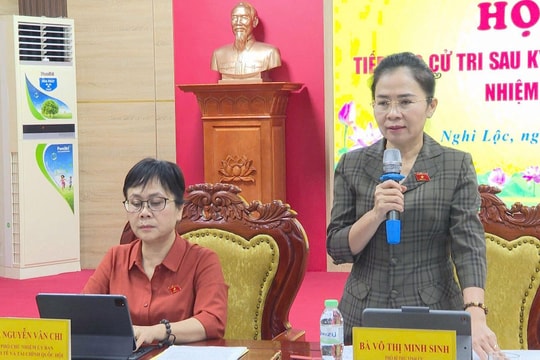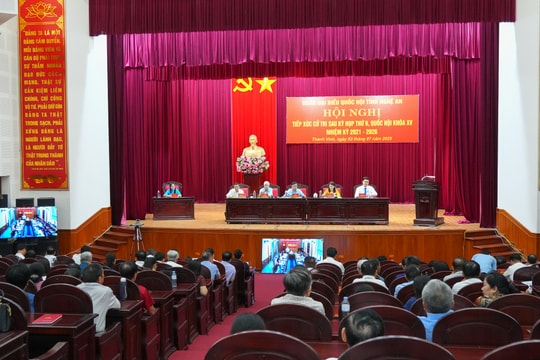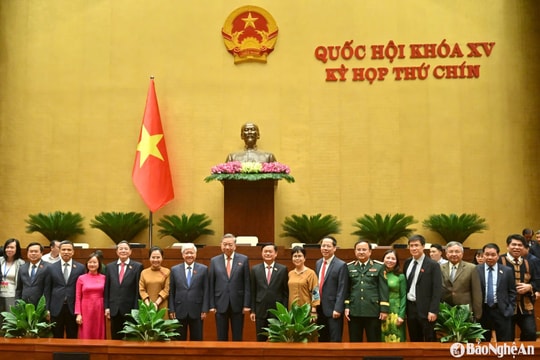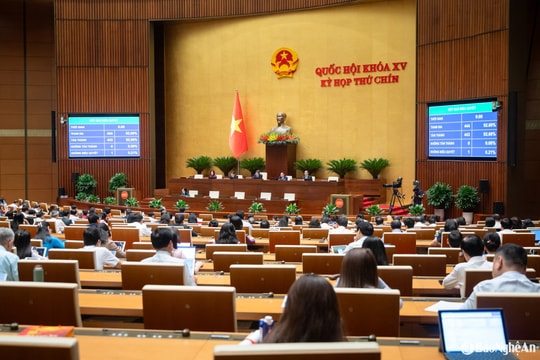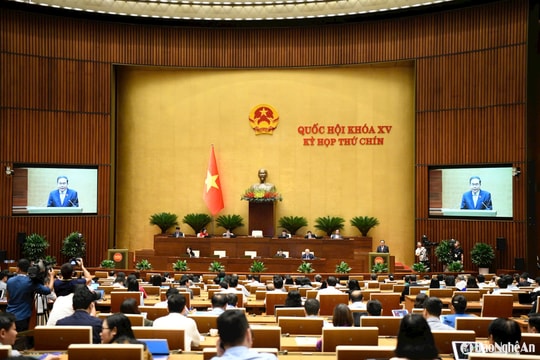National Assembly Delegate Thai Van Thanh: It is necessary to establish a Fund to Support and Develop Vietnamese Cinema.
(Baonghean.vn) - Delegate Thai Van Thanh - National Assembly Delegation of Nghe An proposed that the National Assembly and the Government need to identify the importance of cinema and the necessity to establish a Cinema Support and Development Fund to promote Vietnamese cinema to develop in the direction of both an art and a cultural industry.
On the afternoon of October 28, under the direction of Permanent Vice Chairman of the National Assembly Tran Thanh Man, the National Assembly discussed online the Draft Law on Cinema (amended).
The draft Law on Cinema (amended) consists of 8 chapters and 50 articles, of which 32 articles are inherited, revised, amended and supplemented, and 18 new articles are stipulated compared to the current Law on Cinema.
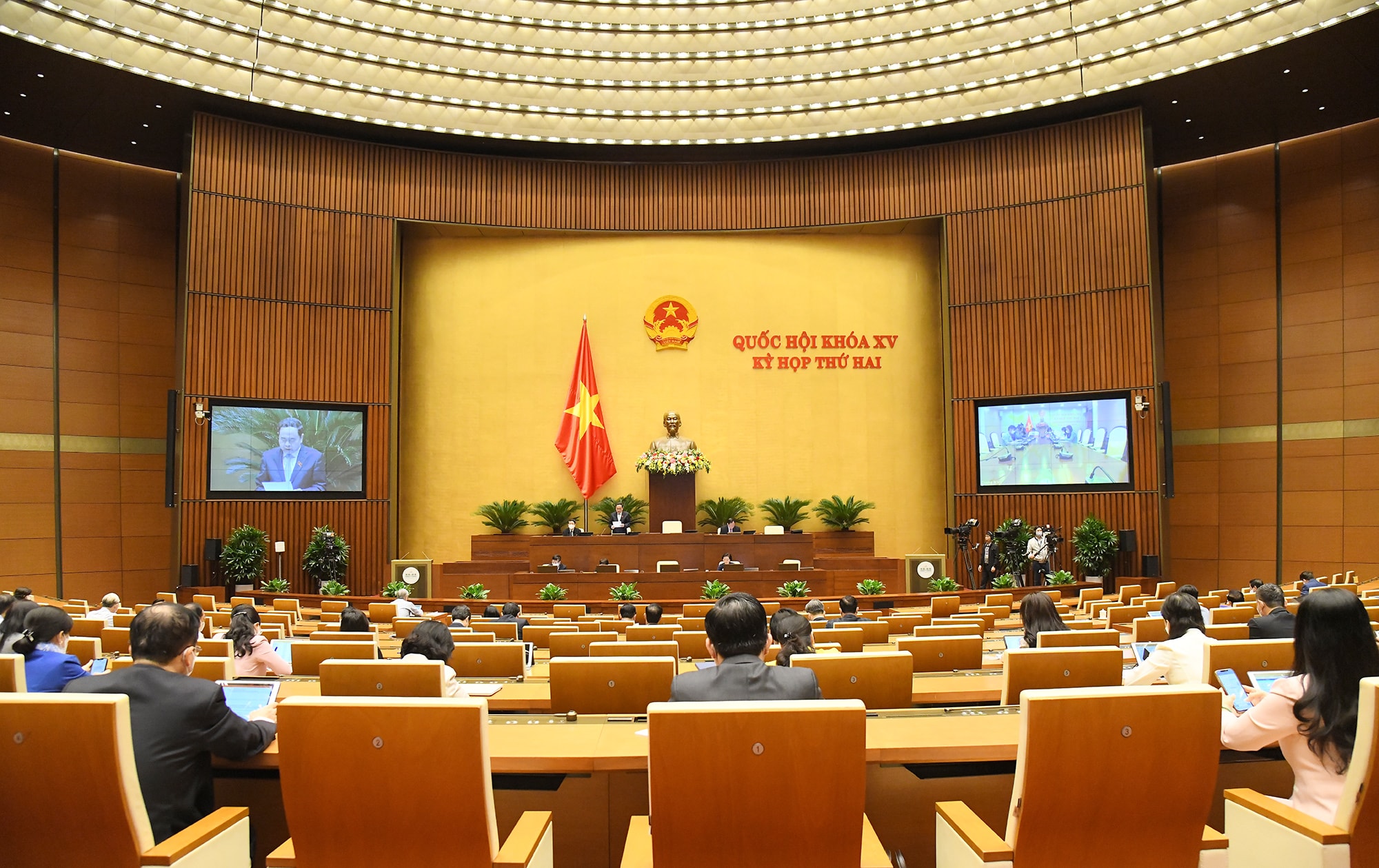 |
| The 2nd session of the 15th National Assembly, at Dien Hong Hall, National Assembly House. Photo: Quochoi.vn |
CONCERNS ABOUT THE CINEMA SUPPORT AND DEVELOPMENT FUND
Regarding the establishment of a Cinema Support and Development Fund, some delegates suggested that this fund should not be established in the Cinema Law (amended), because the current Cinema Law, which was issued 14 years ago, has provisions for establishing a fund but has not been implemented so far.
Speaking at the debate, delegate Thai Van Thanh - Nghe An delegation agreed to establish the Fund for Supporting and Developing Cinema. According to the delegate, this is an effective solution to support investment in young talents, improve the quality of artistic and technical content of cinematographic works, promote the country, people and Vietnamese cinema through high-quality cinematographic works introduced and disseminated to foreign audiences, and participate in international film festivals.
 |
| Delegate Thai Van Thanh speaks during the debate on the Cinema Law Project (amended). Photo: Thanh Duy |
Delegate Thai Van Thanh analyzed: In the current context, the production ordering mechanism using the State budget does not include the production of so-called author films (independent films), art films, and debut films of new talents. Therefore, if the Cinema Support and Development Fund is established, it will be especially effective in supporting and encouraging creative talents; maintaining and developing art films; thereby creating harmonious development between Vietnamese film genres.
On the other hand, according to the delegate from Nghe An, film production is a field that requires large investment, however, recovering capital for reinvestment is very difficult, even at high risk, especially for art films. Therefore, the Fund for Supporting and Developing Cinema also has a role in supporting, encouraging, and sharing difficulties with film producers.
According to the delegate, the current Cinema Law does not have any provision stipulating the State budget for the production of artistic films to compete at international film festivals. “If there is no Cinema Support and Development Fund to invest and encourage talented people, the State will always stand aside and not provide the necessary level of support for works that can help Vietnamese cinema establish its cultural position in the international arena,” Prof. Dr. Thai Van Thanh worried.
Therefore, the delegates proposed that the National Assembly and the Government need to identify the importance of cinema and the necessity to establish a Cinema Support and Development Fund to promote the development of Vietnamese cinema in the direction of both an art and a cultural industry.
Emphasizing that in order for the Cinema Support and Development Fund to be effective, it is necessary to establish a clear management mechanism for this fund. The delegate from Nghe An suggested that the fund should be funded by the State and managed by a specialized management agency with the aim of developing the country's cinema art and supporting filmmakers; at the same time, there should be appropriate regulations on financial contributions from film distribution enterprises' revenue to the fund to contribute to promoting the development of national cinema.
PRE-CENSOR OR POST-CENSOR IS THE MOST COMMON FOR ONLINE MOVIES?
Delegates had many opinions discussing comprehensively issues related to cinema; overcoming the situation of "framework law" and "pipe law"; ensuring suitability, synchronization, feasibility; complying with the Constitution, respecting the rights and legitimate interests of organizations and individuals participating in cinema activities; creating a favorable legal corridor, encouraging the participation of the whole society in developing the cinema industry.
In particular, the dissemination of films on cyberspace has received many opinions from delegates because this is an increasingly popular activity, but there are still many legal gaps.
Delegate Nguyen Van Canh, Binh Dinh delegation agreed with the priority of post-control for the dissemination of movies on cyberspace when the number of movies is too large. However, the issue that the delegate is concerned about is how to control children to watch movies on cyberspace that are age-appropriate.
 |
| Delegate Vi Van Son - Nghe An delegation attended the online discussion session at Nghe An bridge. Photo: Thanh Duy |
According to the delegate from Binh Dinh delegation, rights go hand in hand with responsibilities, therefore, organizations that disseminate movies on cyberspace need to establish a child control system so that adults can manage which movies children can watch that are age-appropriate, and post-control priority will be applied; and organizations that do not have a child control system will apply pre-control.
Regarding this content, after analyzing the advantages and disadvantages of the two options of pre-control or post-control for the dissemination of films on cyberspace, many opinions also agree to prioritize post-control, however, it is necessary to attach responsibility to the film dissemination organization; legal responsibility to the enterprise providing intermediary services...
Another content that delegates are interested in is developing Vietnamese cinema from the perspective of both a creative art and an economic sector, effectively serving to promote the image of our country, people and products.
Delegate Duong Khac Mai - Dak Nong delegation expressed: Cinema of each country in the world is considered as a way to promote the image and national brand. The current trend is that countries put new products into films to promote and introduce before bringing them to the public.
 |
| Permanent Vice Chairman of the National Assembly Tran Thanh Man chaired an online discussion session on the Draft Law on Cinema (amended). |
Therefore, the delegate suggested that the agency in charge of drafting the law should pay more attention to the orientation of the foundation for developing Vietnamese film content, especially on Vietnam's unique strengths that international friends are interested in.
“It is expected that this amendment, the revised Cinema Law, when passed by the National Assembly, will create a legal corridor with sufficient conditions to attract domestic and foreign investors in order to maximize social resources to focus on investment in raising the level of Vietnamese cinema; thereby being able to undertake the mission, along with other forms of culture and art, to promote the image, country, people, cultural values, traditions, heroic revolutionary history of the nation, and Vietnamese cuisine and goods to international friends,” said delegate Duong Khac Mai.
The Minister of Culture, Sports and Tourism spoke to explain and clarify a number of issues raised by National Assembly deputies.

Agree to add the title of typical commune, ward and town in emulation and reward
(Baonghean.vn) - On the morning of October 28, under the direction of Permanent Vice Chairman of the National Assembly Tran Thanh Man, the National Assembly discussed online the Draft Law on Emulation and Commendation (amended).


